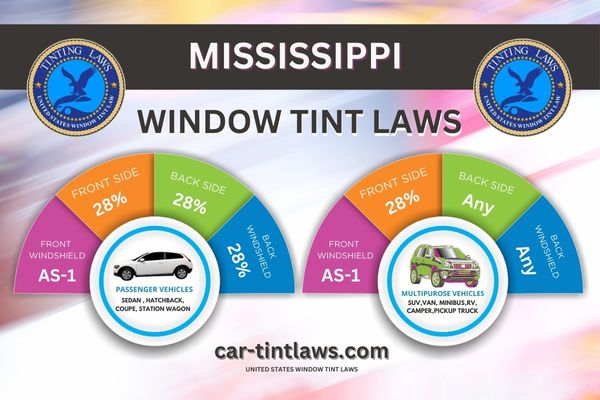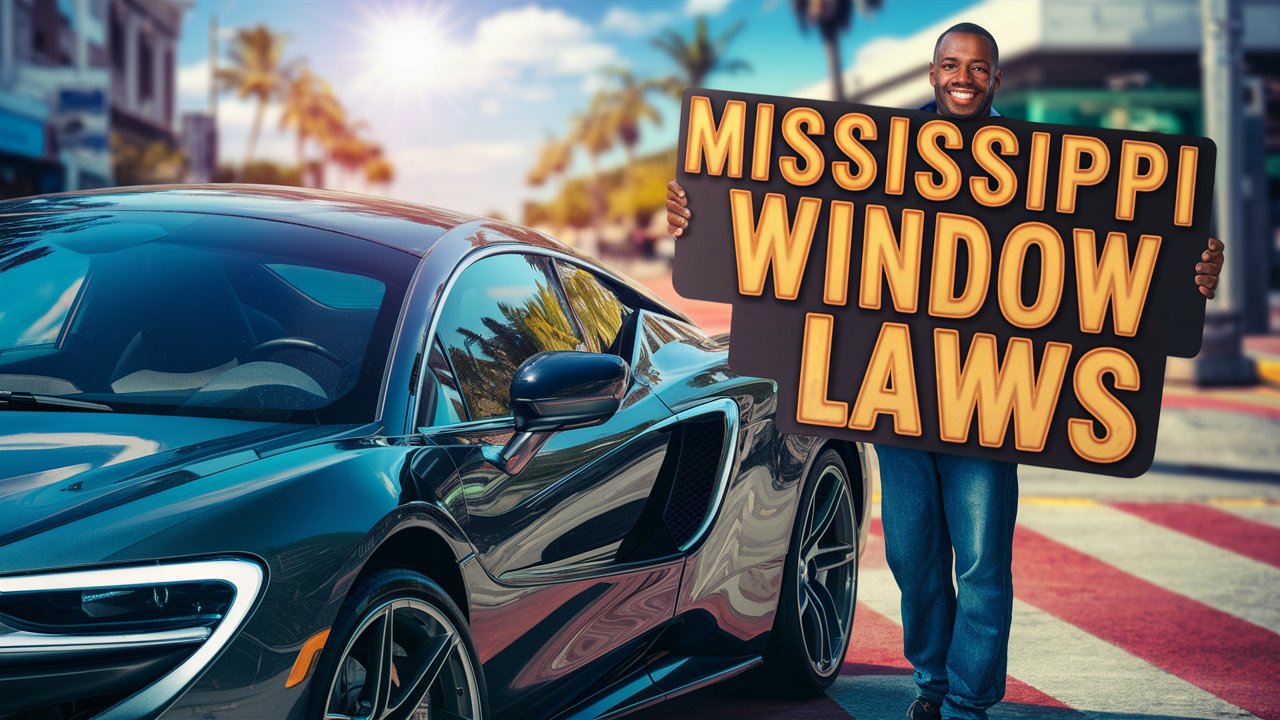When considering window tinting in Mississippi, you should know about the darkness regulations for different vehicles, the reflective limits imposed on all windows, and the specific requirements for legal tint stickers.
These rules aren’t just bureaucratic hurdles; they directly impact your driving experience and legal compliance.
Have you ever wondered why SUVs and vans have more lenient tinting rules compared to sedans, or what the AS-1 line on your windshield signifies?
Understanding these aspects can help you avoid fines and guarantee your vehicle meets state standards.
Window Tint Darkness in Mississippi
When considering window tint darkness in Mississippi, it’s important to know the specific regulations for different vehicle types.
For sedans, the law requires that front and back side windows allow more than 28% of light to pass through.
However, SUVs and vans have more lenient rules, allowing any level of darkness on the back side and rear windows.
Tint darkness for sedans:
- Windshield: Non-reflective tint above the AS-1 line is permitted.
- Front Side windows: Must allow more than 28% of light transmission.
- Back Side windows: Must allow more than 28% of light transmission.
- Rear Window: Must allow more than 28% of light transmission.
Tint darkness for SUV and Vans:
- Windshield: Non-reflective tint is allowed above the AS-1 line.
- Front Side windows: Must allow more than 28% of light in.
- Back Side windows: Any shade can be used.
- Rear window: Any shade can be used.
Window Tint Reflection in Mississippi
When it comes to window tint reflection in Mississippi, you need to know that the law prohibits tint that exceeds 20% reflectivity for both sedans and SUVs/vans.
This limit applies to the front and back side windows of all vehicle types, ensuring uniformity across the board.
Adhering to these reflective limits is essential for avoiding penalties and maintaining safety on the road.
Tint reflection for sedans:
- Front Side windows: Reflective limit must not exceed 20%.
- Back Side windows: Reflective limit must not exceed 20%.
Tint reflection for SUV and vans:
- Front Side windows: Reflective limit should not exceed 20%.
- Back Side windows: Reflective limit should not exceed 20%.
Other Mississippi window tint rules and regulations
- Side Mirrors: No restrictions.
- Restricted Colors: In Mississippi, all tint colors are permitted.
- Certificates: Manufacturers of film need to certify the film they sell in the state. Make sure to ask your dealer if they are using certified film.
- Stickers: A sticker indicating legal tint must be placed between the film and the glass on each tinted window.
- Medical Exceptions: Mississippi permits medical exemptions for special tint. For specific terms of the exemption, refer to Mississippi state law.
- Penalties: For the first conviction, the maximum penalty is $100 and/or 10 days in prison. For the second conviction within a year, the maximum penalty is $200 and/or 30 days in jail. For the third and subsequent offenses within a year, the maximum penalty is $500 and/or up to 3 months in prison.

Medical Exemptions for Window Tint Rules in Mississippi
In Mississippi, specific medical conditions such as albinism, lupus, and photophobia meet the criteria for exemptions from standard window tint regulations.
If you have one of these conditions, you can apply for a medical exception to lawfully have darker window tint on your vehicle.
To initiate this procedure, you’ll need a licensed physician to provide a statement confirming that your medical condition requires darker window tint.
Once you obtain this verification, you will be required to submit an application to the Mississippi State Tax Commission.
This request must incorporate the physician’s certification to substantiate your medical necessity.
The Mississippi State Tax Commission will then examine your application and determine your eligibility for a tinting exception.
This exception, if approved, permits you to use window tint that exceeds the usual legal limits, guaranteeing that your condition is appropriately addressed.
It’s crucial to adhere to these steps accurately to prevent any complications or legal challenges.
Obtaining the exception not only safeguards your well-being but also guarantees that you’re following state regulations.
Do not hesitate to contact the Mississippi State Tax Commission for any inquiries or further assistance throughout the application process.
Mississippi Window Tint Ticket Cost
While medical exemptions provide some flexibility, it’s essential to be aware of the costs associated with violating Mississippi’s window tint laws.
If your car window tint doesn’t comply with state regulations, you could face fines ranging from $25 to $100.
These penalties are enforced by designated law enforcement officers who routinely check for compliance with Mississippi tint regulations.
Violations can occur for various reasons, such as having excessive tint darkness or using reflective tint that exceeds the allowed limits.
These infractions not only result in fines but can also lead to potential legal consequences, making it vital to understand and follow the state’s tinting laws.
To avoid these costs, make sure your car window tint adheres to Mississippi’s tinting laws.
This means checking that the tint percentage falls within the legal limits and avoiding any reflective materials that could attract penalties.
By doing so, you can avoid unnecessary fines and legal trouble.
Mississippi Climate and Geography
Mississippi’s hot summers and high humidity levels make window tinting essential for comfort and protection.
The state’s geography, with its coastal plains and forests, means you’re often exposed to intense sunlight.
Given these conditions, window film helps reduce heat, manage humidity, and block harmful UV rays, making it vital for vehicles and buildings alike.
Hot Summers Impact Tinting
Sweltering summer temperatures in Mississippi make window tinting practically vital for keeping your car’s interior cool.
With average highs ranging from 90-95°F, the intense sunlight and heat can turn your vehicle into an oven.
Proper tinting isn’t just a luxury; it’s a necessity to combat these extreme conditions.
Not only does it help reduce the interior heat buildup, but it also blocks harmful UV rays that can damage both the car’s interior and your skin.
In Mississippi, understanding the tinting laws is essential for achieving the right balance between comfort and compliance.
The state has specific regulations regarding how dark or reflective your windows can be.
These laws guarantee that your window tinting meets safety standards while still providing the necessary protection from the sun.
Humidity and Window Film
Given Mississippi’s humid subtropical climate, understanding how humidity affects window film is vital for guaranteeing its durability and performance.
High humidity, common in Mississippi, can impact the adhesion and installation of window film.
Mississippi laws specify that your window tint must allow a certain percentage of light through, and excessive humidity might interfere with achieving this requirement.
When installing window film in a high humidity environment, professional expertise is essential.
High humidity levels, ranging from 60-80% throughout the year, can prolong the curing time of the adhesive used in window films.
This extended curing period may affect the overall installation process, potentially leading to bubbles or peeling if not done correctly.
Despite the challenges posed by humidity, properly installed window film can still provide significant benefits.
It helps reduce glare and heat inside vehicles, making them more comfortable to drive in Mississippi’s climate.
To guarantee your window film remains effective and long-lasting, it’s important to work with experienced professionals who understand the impact of Mississippi’s humidity on the installation process.
By doing so, you’ll comply with Mississippi laws and enjoy the benefits of a properly tinted window.
UV Protection Necessity
Due to its location in the southern United States, Mississippi faces high levels of UV radiation that make UV protection essential for vehicle occupants.
The intense sunlight in Mississippi can be harmful, so protecting yourself and your passengers is vital.
Window tinting laws in Mississippi state allow for certain levels of tint to be applied to your vehicle windows.
This helps block harmful UV rays, notably reducing the risk of skin damage and interior fading.
By adhering to Mississippi’s window tinting laws, you establish a barrier against the sun‘s intense rays during long drives.
These laws specify how much tint is legally permissible, balancing safety and protection.
Proper window tinting can decrease UV exposure, making your driving experience more comfortable and safe.
It’s a straightforward and effective measure to maintain the well-being of everyone inside the vehicle.
Incorporating UV protection through window tinting is not just about compliance; it’s about ensuring that you, your family, and friends are shielded from potential UV-related harm.
Given Mississippi’s climate, understanding and following window tinting laws is a practical step towards enhanced protection and comfort on the road.
References
Mississippi Code section 63-7-59: Windows and window glass generally
Frequently Asked Questions
What Is the Darkest Legal Tint in Mississippi?
You’re wondering about the darkest tint allowed in Mississippi.
For vehicle safety, the legal limits are more than 28% light transmission for front, back side, and rear windows.
SUVs and vans, though, can have any darkness on back windows.
How Do I Get a Tint Exemption in Mississippi?
Did you know 10% of tint exemption requests are for photophobia?
To navigate the exemption process, you’ll need a doctor’s certification for medical reasons.
Submit it to the Mississippi State Tax Commission to meet legal requirements and join the approved.
What State Has the Darkest Tint Law?
If you’re curious about the darkest tint laws, Alaska tint regulations are quite strict. Hawaii window tint also has limitations, while California tint laws are a bit more lenient but still have specific guidelines you’ll need to follow.
What Is the Darkest Tint?
The darkest tint limits tinting visibility to a large extent, offering privacy and UV protection as benefits.
However, it can obstruct night driving visibility. Customization options let you balance these benefits and drawbacks to suit your personal style and needs.
Conclusion
Understanding Mississippi’s window tinting laws is essential for compliance and ensuring safety on the road.
With specific requirements for sedans, SUVs, and vans, along with regulations on reflective limits and tint colors, you can’t afford to ignore these rules.
Don’t forget, legal tint stickers and certified films are mandatory. By following these guidelines, you’re not only abiding by the law but also enhancing your vehicle’s functionality and appearance.
Stay informed, stay compliant, and drive safely.
